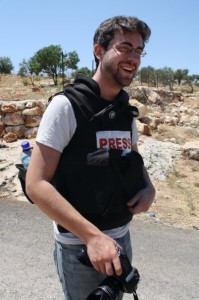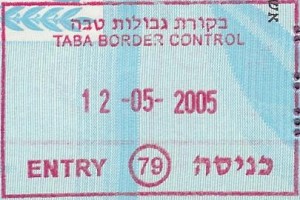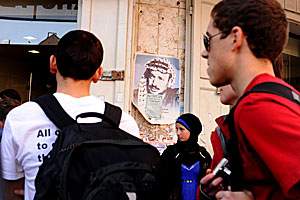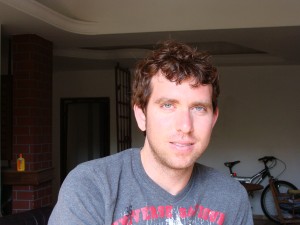 The National, January 23, 2010
The National, January 23, 2010
After a week spent fighting a deportation order, Jared Malsin, the Jewish American editor of a Palestinian news service, was expelled from Israel on Wednesday. His departure brought his legal battle to a sudden halt, closing a case that many critics viewed as an Israeli attack on press freedom.
But the story hasn’t ended—Malsin’s sudden expulsion has only sparked more controversy. The Israeli Ministry of Interior says that Malsin left willingly. But Malsin, 24, says that he was duped into signing the piece of paper that effectively finalized his deportation and closed his case.
On the morning of Tuesday, January 19, Malsin and his attorney discussed the possibility of Malsin’s leaving Israel as his court cased continued. Malsin had spent a week in a small cell with only ten minutes a day outside. Security officials had confiscated his belongings, leaving Malsin unable to change his clothes or brush his teeth. Unable to cross the border, Malsin’s only way out of detention was to leave the country.
But Malsin was not willing to leave at the expense of his legal proceedings.
That afternoon, after Malsin’s attorney was gone, two guards at the airport’s detention center approached Malsin and said he was free to leave, provided he make a statement in writing. “They came to me and said you can go, you just have to sign this piece of paper. They led me to believe it was a formality…. I didn’t know I was going to be deported,” Malsin recalls. “And there was never any indication that this would affect the legal issue at all.”
Malsin wrote a short note on a blank page, “I wrote that I wished to travel, and that I did so without personal coercion from the staff of the detention center or the ministry of the interior. That was it.”
Reflecting on the moment, Malsin says, “If I could go back I would have refused to sign [the paper] and would have demanded that my lawyer be involved. I had so little access to information about my own case and had very little grasp of what the issues were,” he says. “I was misled.”
The following day, Malsin, unaware that his signature had effectively ended his court proceedings, was placed on an armored vehicle, he says, “with steel mesh over the windows. They drove me onto the tarmac and then marched me onto the plane.”
The Ministry of the Interior offers a different version of events. Haddad remarks, “Two days ago he decided that he didn’t want to stay in the airport anymore. That’s it.”
Malsin takes issue with the Ministry of the Interior’s statements: “This whole notion that the Ministry of Interior is putting out now that I left in voluntarily is nonsense.”
Haddad also claims that, when the deportation order was initially issued, the Ministry of the Interior was not aware of the fact that Malsin is a journalist. “I find it amazing that she [Haddad] is saying that. It’s a palpable lie,” Malsin says. The fact that he is a journalist “became clear very early on” during the interrogation, according to Malsin.
He adds, “They [the officials who conducted the questioning] said that they were able to search around on the internet and read some of my work… They made it clear that they were unhappy that I was ‘critical of Israel’—this is their language.”
When asked if his work was, indeed, critical of Israel, Malsin responds, “The role of journalism is to monitor and challenge the centers of power. In that sense, yes, as much as I am critical of the Palestinian Authority and Hamas.”
Was his detainment and deportation politically motivated? Malsin responds, “I have no choice but to conclude that it was political… I was summarily incarcerated and deported for my work.”
Despite his ordeal, Malsin hopes to return to the West Bank to resume his life and his work. In the meantime, his attorney plans to challenge the closure of his case because of, as Malsin puts it, “a lack of transparency.”
Malsin, editor of the English section of Maan News Agency, was detained by authorities in Ben Gurion International Airport on Tuesday, January 12, as he attempted to return to Israel and the Occupied Palestinian Territories following a holiday in Prague. After eight hours of interrogation Malsin was deemed a “security risk” and slated for deportation on Thursday, January 14. In Hebrew language court records obtained by Maan, the Israeli Ministry of the Interior accuses Malsin of being uncooperative, lying to border officials, and violating the terms of his visa; these same documents also cite Malsin’s writings “criticizing the State of Israel” and the fact that he wrote articles “inside the [Palestinian] territories.”
Sabine Haddad, spokesperson for the Ministry of the Interior, states that the decision to detain and deport Malsin was based on his “refusal to cooperate.”
“[Malsin] arrived to the border, authorities asked him to answer questions, and he refused,” Haddad says. “This is a minimal right of a country to ask questions of anyone who wants to enter.”
Malsin and his attorney, Castro Daoud, appealed the Ministry of the Interior’s decision on the grounds that the allegations against Malsin did not sufficiently prove him to be a security risk. Daoud also stated that Malsin’s deportation would be a violation of press freedom. Tel Aviv District Judge Kobi Vardi called for a hearing, indicating that there was enough evidence to contest—or overrule—the Ministry of Interior’s decision.
Due to Malsin’s Wednesday deportation to New York City, however, the case has been closed.
 The Huffington Post, January 28, 2010
The Huffington Post, January 28, 2010







